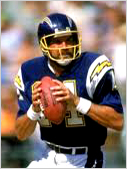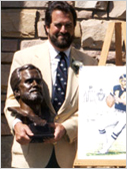
 Dan Fouts was born June 10, 1951 and is a retired Hall of Fame American football quarterback in the National Football League. Fouts played his whole career with the San Diego Chargers from 1973 through 1987. He is one of the most prolific passing quarterbacks during the Golden Age of the 70s and 80s, but the Chargers were unable to make it to the Super Bowl during his fifteen year career. He is currently a color commentator for NFL games on CBS. Dan is the son of Bay Area Radio Hall of Famer Bob Fouts. Hire Dan to Meet and Mingle for your clients, employees and customers.
Dan Fouts was born June 10, 1951 and is a retired Hall of Fame American football quarterback in the National Football League. Fouts played his whole career with the San Diego Chargers from 1973 through 1987. He is one of the most prolific passing quarterbacks during the Golden Age of the 70s and 80s, but the Chargers were unable to make it to the Super Bowl during his fifteen year career. He is currently a color commentator for NFL games on CBS. Dan is the son of Bay Area Radio Hall of Famer Bob Fouts. Hire Dan to Meet and Mingle for your clients, employees and customers.
PRO FOOTBALL CAREER
Drafted in the third round out of the University of Oregon in 1973, Fouts helped lead the Chargers to the playoffs from 1979 to 1982 and twice to the AFC title game (1980 and 1981). He led the league four times in passing yards; ending his career with over 40,000, the third player to surpass that landmark. Fouts was elected to the Pro Football Hall of Fame in 1993.
Fouts was a 6-time Pro Bowl selection (1979-1983 & 1985) and compiled passer ratings over 90.0 for a 3-year stretch (1981-83). Fouts threw for over 4,000 yards for 3 consecutive seasons (1979-81), led the NFL in passing yards in 4 consecutive seasons(1979-1982) and 6 times eclipsed the 20-touchdown mark with a career high 33 in 1981. His career high of 4,802 passing yards during the 1981 season was an NFL record at the time.
In 1982, a season shortened to 9 games because of a strike, Fouts averaged what is still a record of 320 yards passing per game. Highlights that season included back-to-back victories against the 1981 Super Bowl teams San Francisco (41-37) and Cincinnati (50-34) in which Fouts threw for over 400 yards in each game to lead the Chargers to shootout victories.
Fouts garnered All-Pro selections in both 1979 and 1982, while also being named 2nd Team All-Pro in 1980 and 1985. In addition Fouts was also named 2nd Team All-AFC in 1981 and 1983. However, Fouts and the Chargers lost both AFC Championship Games in which they played.
Fouts's first few years in the league were inauspicious, but with the arrival of Don "Air" Coryell in 1978 the Chargers' fortunes turned. Yet it was actually two years earlier, with the arrival of Joe Gibbs as the Charger's offensive coordinator, that the seeds of success were planted. Under Coryell, the Chargers were known for the deep passing game and the involvement of the tight end as a key receiver. This required a tough, intelligent quarterback with a strong arm. Fouts fit the bill.
Fouts was not a mobile quarterback and the deep passing game led to many hits. Fouts's ability to take punishment and still play at a very high level is unique. Rarely using the shotgun, Fouts would drop back from center and look for one of a bevy of great receivers. Wide receiver Charlie Joiner and tight end Kellen Winslow were the most famous, both now in the Hall of Fame, but John Jefferson and Wes Chandler, among others, were also key. Fouts's passing enabled Winslow to lead the NFL in receptions twice (1980,1981), while Winslow (1982) and Lionel James (1985) led the AFC in receptions on another 2 combined occasions. James, in fact, set the NFL record (since broken) in 1985 for receiving yards by a running back at 1,027. Jefferson became the first receiver to have 1,000 yards receiving in each of his first three seasons in the NFL. Both Jefferson (1980) and Chandler (1982) led the NFL in receiving yards. Chandler's 129 yards receiving per game average in 1982 is still a league record. Both Jefferson (1978, 1980) and Chandler (1982) led the NFL in receiving TDs. In 1980, Winslow, Jefferson and Joiner became the first trio on the same team to have 1,000 yards receiving in a season. When he retired after 1986, Joiner was the NFL's all-time leader in receptions with 750.
Pass protection was also critical for such an offense. The Chargers had an excellent offensive line which protected Fouts well, and included 4 time Pro Bowler Ed White, 5 time Pro Bowler Russ Washington, 3 time Pro Bowler Doug Wilkerson, Billy Shields and Don Macek. The Chargers led the league in passing yards an NFL record 6 consecutive years from 1978-1983 and again in 1985 under Fouts. They also led the league in total yards in offense 1980-1983 and 1985.
Despite going to the playoffs from 1979 through 1982 and playing in 2 AFC Championship Games, the Chargers never went to the Super Bowl under Fouts (although they went 7 years after his retirement). Usually this is attributed to poor defense and their unwillingness to run the ball. In Fouts's prime the defense was not as stellar, but the running game became far better with the addition of Chuck Muncie, traded from New Orleans in 1980, and the drafting of James Brooks from Auburn in 1981. It is believed the defense had little opportunity to improve as the offense often scored quickly, leaving the defense to spend far too much time on the field. It also hurt that Fred Dean, an All-Pro sack specialist, was traded away to the San Francisco 49ers in 1981 in a contract dispute, and Dean would win UPI NFC Defensive Player of the Year (while playing in only 11 games) that year en route to a Super Bowl victory and help the 49ers to another Super Bowl title three years later. Dean would later be inducted into the Hall of Fame.
"I can't say how much it affected us, because we did make it to the AFC championship game," said Chargers' All-Pro defensive lineman Gary "Big Hands" Johnson of the loss of Dean. "But I could say if we had more pass rush from the corner, it might've been different."
Overall, the Chargers achieved three wins against four losses in the playoffs under Fouts, who threw for over 300 yards in all but two of those games. One of their more notable wins was the 1982 playoff game known in NFL Lore as The Epic in Miami, where Fouts led his team to a 41-38 victory by completing 33 of 53 passes for a franchise record 433 yards and 3 touchdowns on the hot and humid day. His completions, attempts, and yards in the game were all NFL postseason records at the time. The following week in the AFC championship game in Cincinnati, there was a 144 °F drop in temperature compared to the previous week in Miami, and the Chargers lost 27-7 in what is known as the Freezer Bowl.
The following season, he threw for 333 yards and 3 touchdowns in a 31-28 win over the Pittsburgh Steelers in the AFC divisional playoff round.



![]()


